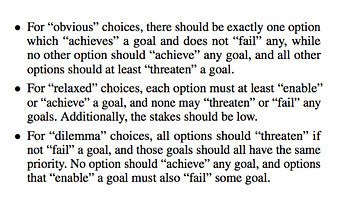If you will allow me to introduce a couple of definitions to clarify some questions I want to ask about craft, I recently rewatched an Extra Credits video in which the word calculations is defined as “decisions based solely on reason with a clear correct answer”, and choice as “overcoming internal conflict”. To give an example of the former, when I made a certain decision in I-0 based solely on my belief that it was clearly the only option that would allow me to avoid getting stung by a scorpion, I made a calculation based on the information available and not a choice. On the other hand, if I am playing a CRPG, and I decide to fight one more mob before returning to town for more supplies, then I have arguably made a choice because the game has set my desire to level up quickly against my desire to avoid losing a battle for a lack of supplies. (More examples can be found in the video.)
One more note before my questions: It seems to me that while many games suffer for a lack of choice, parser IF—or most of the best-loved parser IF anyway—has thrived while offering few decisions other than calculations. Take Counterfeit Monkey for example. If I am waving the t-remover at an object, I am almost certainly not resolving a conflict; rather I am making the calculation that the transformed object will help me solve a puzzle. And in the age of parser IF that avoids “cruelty”, it is not even the case that a short-term desire to test everything that can be done to an object will ever be pitted against the long-term goal of completing the work.
Anyway, I have been wanting to ask,
(1) Can you think of a well-loved IF work that relies to a significant extent on choice?
(2) Would you say the “choices” offered in CYOA tend to be choices, calculations, or neither?
(3) What role does choice play in the IF you write?

